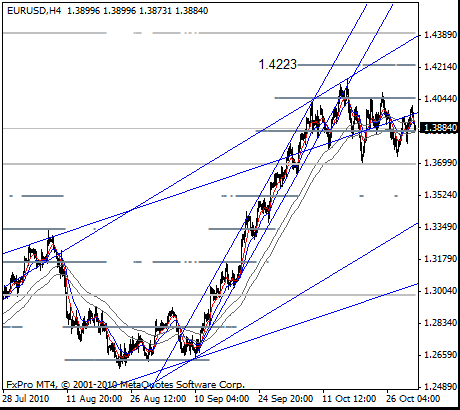Bullish for the euro ?
Last Friday’s EU “summit” saw the adoption of a change to the EU Constitution (aka the Lisbon Treaty) which gives the EU the right to impose restructuring on bond holders in the event that any nation comes to rely on the bail out fund. Given the short term expediency of the motive underlying the move, largely attributable to the threat to Merkel from the German Constitutional court in Karlsruhe, the fact that this has other ramifications cannot be considered surprising. Notably, the ECB’s Jean-Claude Trichet warned EU leaders on Thursday night that their actions were dangerous, and that they did not understand what they were unleashing.
He is reported to have pointed out, in quite blunt terms, that what this new scheme ensures is higher interest rates all across the Euro area. The assumptions of bond investors that the ECB would continue to bail out individual countries has finally been shown to have beeen completely unwise, but it was investment decisions based on this assumption that brought interest rates for the PIIGS close to German levels. By presuming no default risk on the part of PIIGS countries, interest rates were driven lower than they ever could have been had that been factored into the thinking of the market participants buying PIIGS debt. There is no rational justification for yields on Greek paper being as close as they were to yields offered by Germany.
The phrasing of the language being used by Axel Weber, head 0f the Bundesbank, that “bond holders will have to be part of the solution, not part of the problem” can now be taken as a fairly clear indication that PIIGS bondholders will face being defaulted on with no expectation of an ECB bail-out, and thus the bonds of the southern European economies will be priced accordingly. The relief this will create on the economies of those countries being called on to make the bailouts, i.e. the northern countries, will inevitably lead to a strengthening of the Euro. This will leave the PIIGS with the worst of both worlds; a currency whose exchange rate is far too high for their economies, and the loss of the low interest rate regime that formerly accompanied it. Just to be clear, the days of low interest rates for the PIIGS are gone for good.
There are a couple of points that will arise directly from this outturn of events. Projections made by various economists suggesting Greek debt rising to as high as 150% of GDP have been founded on assumptions of high growth and steady tax revenues. However, the Greek economy is still shrinking and tax revenues are still falling, thus these growth assumptions will prove to be wildly optimistic, and thus debt levels could rise above 200% of GDP within a very short space of time.
This then creates the scenario where purchasers of Greek debt will evaporate. Who will buy Greek debt if Greek debt levels are going to rise this high, especially in the absence of an ECB guarantee of Greek debt ? The measures announced have therefore thrown Greece into a debt trap. Greek debt levels are projected to rise too high for them ever to pay it off. Thus Trichet’s words will prove to be prescient. Effectively, German taxpayer refusal to fund Greece has led to Germany cutting Greece loose from the Euro area. In the absence of an ECB guarantee, Greek debt is now just as toxic for investors as if Greece were not in the Euro area, and therefore Euro membership now holds very few advantages for Greece.
With this unpalatable truth forced on them, the Greeks are now free to leave the euro and it will have no impact on their credit situation. The re-introduction of their own currency at a dramatically lower valuation will do wonders for Greek export prospects. Also, once Greece goes, pressure will mount on the other PIIGS countries as they will be faced by a similar dynamic.
How much of this news has been discounted by the rise from the 6th June 1.1876 low ? Technically, the market remains in consolidation mode between the 1.3690 area and the recent high around 1.4150, but we continue to anticipate further gains above 1.42
Category: EUR, Geo Politics Comment »
